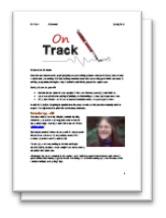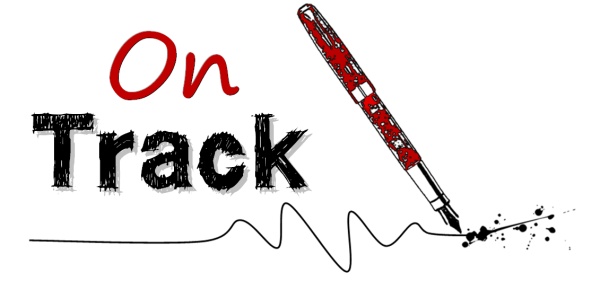How to Get Your Writing Project Started – in Four Easy Steps
Hope you enjoy this post! 🙂
On Track is only open for registrations until this Friday (8th April), so if you want to join the course, I suggest you pop on over to the On Track page now!
You’ve got a big project which you’d love to get going. Maybe you started it once – months or even years ago – but it’s been stalled for a while.
- You registered a domain name, but you’ve never got round to starting your blog
- You’d love to write and sell an ebook, but you can’t find the time to begin
- You’ve got 10,000 words of a novel tucked away in your wardrobe – they’ve been there for a year
And you probably feel bad, or sad, about it. You know that if you could just get it done, you’d feel great. You wish you were more self-disciplined, more focused, more creative, more …
… well, more like a real writer.
I’m gonna let you into a secret here. You’re already a real writer. And the pros struggle just as much as you do. (Ever since I got back from Austin on March 18th, I’ve been meaning to start work on a new project. I only managed to begin yesterday.)
It’s absolutely normal to feel a certain sense of reluctance when starting a big project – or when you’re getting back into one that’s lain dormant for a while.
The thing is, you’ll never feel quite ready to write. You’ll always think that there’ll be a better time – when you’ve got more energy, when life isn’t quite so hectic, when chores have been ticked off. Writing is hard work – emotionally, mentally – and there’ll always be a great excuse not to write.
But you want to write. And here’s how:
#1: Pick Somewhere to Start
One of the reasons we get stuck is because we don’t know where to begin.
If you have a huge project with no obvious beginning, start with whatever feels easiest. That might be a section of your ebook which doesn’t require much research, or a post for your blog which is straightforward to write.
Sometimes, one particular section of a project seems especially attractive. You don’t have to start at the “beginning” – if you’re itching to write Chapter 3, jump in there.
Above all, don’t get bogged down deciding where to begin. There’s rarely one perfect place – and you’ll end up with a complete project eventually.
#2: Make a Writing Appointment
If you’re going to write, you need to carve time out of your schedule. Block out at least an hour, ideally two. During that time, you’re going to write.
If you’re not sure you’ll stick to that appointment, try:
- Getting out of your house. Take a notebook and pen, or your laptop, to a local cafe.
- Setting your writing time an hour before your favourite TV show. If you know that you really do only have an hour, you’re more likely to get on with the writing!
- Telling other people – your spouse, kids, parents, Twitter followers – that you’ll be writing, and that you’ll need to be left in peace for an hour or two.
Really can’t find an hour? Then block out just fifteen minutes – first thing in the morning works well, or straight after dinner.
#3: Give Yourself a Warm-Up
Instead of staring at the blank page, trying to force yourself to start, do a writing warm-up.
That means spending the first ten minutes of your session writing as fast as you can, about anything at all. You can pick a word, idea or theme, or just pick from one of the three below prompts:
- A blue glass frog falls and breaks.
- “There’s never any sunlight here.”
- The worst idea I ever had was …
You can write fiction, non-fiction, memoir, poetry … whatever you want. The point is to get your writing muscles moving – you can delete the piece as soon as you’re done.
#4: Use a Timer
Timers aren’t just great for writing warm-ups. They can help you focus on your big project.
There are a bunch of timers around – I tend to use Tick Tock Timer, but you can find plenty of others. When I want to focus on a piece of writing, I typically set a timer for anywhere between 20 minutes and one hour, and while the timer is ticking, I just write.
Maybe you feel there’s no real difference between setting aside an hour in which to write, and setting aside that hour with a timer ticking away. All I can say is give it a try – I’ve been amazed how effective this is for keeping me on track.
Over to you…
- Write down the name of the project you want to get going on. If you want, share it here in the comments.
- Now, set a timer for 15 minutes and work on your project. You can manage 15 minutes, I promise!
 Enjoyed this post? You can download the introduction to On Track completely free (you don’t even need to give me your email address).
Enjoyed this post? You can download the introduction to On Track completely free (you don’t even need to give me your email address).
And if you’d like to receive weekly lessons during April and May, and have the chance to interact with other writers and ask me anything at all about writing, then check out the On Track page. By the end of May, you’ll have made serious progress with your project. But move fast – registration’s only open until this Friday (8th April).
About

I’m Ali Luke, and I live in Leeds in the UK with my husband and two children.
Aliventures is where I help you master the art, craft and business of writing.
Start Here
If you're new, welcome! These posts are good ones to start with:
Can You Call Yourself a “Writer” if You’re Not Currently Writing?
The Three Stages of Editing (and Nine Handy Do-it-Yourself Tips)
My Novels

My contemporary fantasy trilogy is available from Amazon. The books follow on from one another, so read Lycopolis first.
You can buy them all from Amazon, or read them FREE in Kindle Unlimited.
14 Comments
Trackbacks/Pingbacks
- work.life.creativity. » Blog Archive » Getting Your Project Started - [...] Luke, writing at Aliventures, has a writing course (not an affiliate link or anything like that): You’ve got a…



i do make writing appointments 🙂 though sometimes i still miss them still the method is very effective
Thank you Ali 🙂
Ali, this is gold. Like Farouk, keeping the appointment is where I really struggle. I get distracted too easily by shinny objects.
Todd’s last blog post ..Why I Turned to the Darkside
The more you do it, the easier it gets… honest! 🙂
This is a useful post, Ali.
Since I know too many people, I try to find a secluded corner where I can write. That isolation provides a sense of freedom. I find it difficult to write when there are distractions. Solitude also provides peace of mind to writers.
However, all writers are not the same. I know creative people who are multi-taskers and thrive on distractions.
They are disorganised and do just fine. Me, I can’t work that way.
I guess you need to find what works for you. And then just go out there and do it. Me, being out and about in the woods ignites the creative spark. There is nothing to beat the beauty of natural and scenic rides and views.
Away from the hurly burly of madding crowds, one can appreciate the chirping of the birds and the murmur of the brook. And that’s just what it takes to inspire a poem or a turn of phrase for a writer. Cheers.
Thanks Archan! I think we all need some degree of space and peace to write … I’ve rarely met writers who did their best work in busy or noisy places. Personally, I find it impossible to write if anyone’s able to see my computer screen — I just can’t get the words out!
The great outdoors has always been popular with writers, and I’m sure with good reason; like you say, nature can be very inspiring.
Wow, I don’t think I could work with a timer going, but I rarely have problems getting started. Peace and solitude are lovely things too rarely achieved, thus I’ve developed a writer’s snarl (“I’m writing, I’ll be done in ten minutes, please don’t bother me again if you value your life.”) I would be nicer about this to the other member of the household except that if someone is staring at the screen and typing furiously, odds are they are creating something, yes?
Charleen Larson’s last blog post ..Oodles of doodles
I can see how the timer thing might be a bit pressurising for some folks. I like it a lot (did a couple of 20 minute timers this morning and got 2 blog posts written…)
Nothing wrong with a bit of snarling 😉 My (longsuffering) husband understands that if my study door is shut, I probably don’t want interrupting!
Those are a good set of instructions for those who are struck at the beginning itself. Once started the job is easier. We need to set our goal of becoming an established writer and dream about it and the laurels that we are going to receive. This might help us in overcoming the initial bloackade to our task.
Ranjith’s last blog post ..Reflection in the mirror-In search of what constitutes my life
Thanks Ranjith! I think dreaming about it is good — but actively planning and working towards it is even better. 🙂 And I agree with you that once we get started, it gets easier.
I think point three is absolutely critical and I’d take it a step further to say – break down all barriers, and just write. What seems like eons ago now – I recall my college days and my intentional interest in procrastinating, knowing full well that my best writing does indeed come under the greatest time pressures. To some degree I still operate this way (just don’t tell my clients!). But, getting back to point three, so much of school and business life is regimented as it relates to writing – school style, AP style, Chicago style, intro/body/conclusion, executive summaries, bibliographies, yada yada… With all of the formatting – and in some cases the spoken and unspoken expectations (make sure your paper is at least 10 pages long, don’t forget the exact APA citations) the practice of writing is, to some degree, lost in the mix. When I work with others on their writing skills, I recommend they sit down with a sheet of paper and do nothing but write. Some of the best work is created when all of the barriers are down – the formatting can always come later.
Jesse Green’s last blog post ..How a Few Used Social Media for the Betterment of Many – quakebook
Thanks Jesse! And I definitely think that just sitting down and writing is important — especially if you’re feeling a bit stuck or blocked. I often find that even opening up the document is enough to get me in the writing mood again…
hi Ali thanks for the four easy stops of wirting a project am much thanksfull God bless you.
margaret.
i was inspired when i red this.thanks so much for the posting.
so good how can I write mine